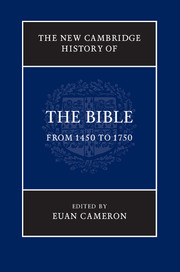Book contents
- Frontmatter
- Contents
- List of figures
- List of contributors
- Preface
- List of abbreviations
- Introduction
- PART I RETRIEVING AND EDITING THE TEXT IN EARLY MODERN EUROPE
- PART II PRODUCING AND DISSEMINATING THE BIBLE IN TRANSLATION
- PART III PROCESSING THE BIBLE: COMMENTARY, CATECHESIS, LITURGY
- 16 Authority
- 17 Theories of interpretation: The quadriga and its successors
- 18 The importance of the Bible for early Lutheran theology
- 19 The Bible in Reformed thought, 1520–1750
- 20 The Bible in Roman Catholic theology, 1450–1750
- 21 Orthodox biblical exegesis in the early modern world (1450–1750)
- 22 The Bible in the pulpit, 1500–1750
- 23 The Bible in catechesis, c. 1500– c. 1750
- 24 The Bible in liturgy and worship, c. 1500–1750
- PART IV THE BIBLE IN THE BROADER CULTURE
- PART V BEYOND EUROPE
- Afterword
- Select bibliography
- Select Bible bibliography
- Index
23 - The Bible in catechesis, c. 1500– c. 1750
from PART III - PROCESSING THE BIBLE: COMMENTARY, CATECHESIS, LITURGY
Published online by Cambridge University Press: 05 August 2016
- Frontmatter
- Contents
- List of figures
- List of contributors
- Preface
- List of abbreviations
- Introduction
- PART I RETRIEVING AND EDITING THE TEXT IN EARLY MODERN EUROPE
- PART II PRODUCING AND DISSEMINATING THE BIBLE IN TRANSLATION
- PART III PROCESSING THE BIBLE: COMMENTARY, CATECHESIS, LITURGY
- 16 Authority
- 17 Theories of interpretation: The quadriga and its successors
- 18 The importance of the Bible for early Lutheran theology
- 19 The Bible in Reformed thought, 1520–1750
- 20 The Bible in Roman Catholic theology, 1450–1750
- 21 Orthodox biblical exegesis in the early modern world (1450–1750)
- 22 The Bible in the pulpit, 1500–1750
- 23 The Bible in catechesis, c. 1500– c. 1750
- 24 The Bible in liturgy and worship, c. 1500–1750
- PART IV THE BIBLE IN THE BROADER CULTURE
- PART V BEYOND EUROPE
- Afterword
- Select bibliography
- Select Bible bibliography
- Index
Summary
Catechesis formed a key element in the strenuous campaigns of both Protestant and Catholic clergy to raise levels of religious knowledge and spiritual awareness among their charges in early modern Europe. But compared to many of the methods of teaching and inspiring the less educated that were then tried, catechesis tended at first to be pursued with caution: the need for simplicity and brevity, for example, meant that the Bible was usually deployed in a traditional way, and in pursuit of a limited number of ends. From the later sixteenth century, however, there was a greater emphasis on the use of Scripture proofs, and increased interaction between catechising and other modes of religious instruction involving the Bible, so that in many countries by the end of the early modern period a much wider range of catechumens were being encouraged to develop a closer acquaintance with the Bible. In this chapter, a brief survey of the development of catechesis will be followed by a survey of what Catholic and Protestant catechists had in common and what separated them in their attitudes to the Bible.
The Greek verb katechizo means literally to make hear, hence to instruct, and in the New Testament it is used to signify instruction ‘in the way of the Lord’, the Law, or the Word (Luke 1:4; Acts 18:25; Rom. 2:18; Gal. 6:6). The forms of instruction given during the patristic and early medieval periods to adult katechumenoi to prepare them for baptism and communion concentrated on teaching strict adherence to the will of God through abstention from vices such as idolatry and the pursuit of virtues such as charity; but in succeeding centuries catechising gradually shifted towards a more general instruction for adolescents and adults. From the eighth century at least, parents and godparents were expected to be able to recite the Our Father and the Apostles’ Creed, and by the late Middle Ages, as a result of oral catechesis from the pulpit, penitents at their annual confession were also expected to be familiar with the Ten Commandments and the seven sacraments, works of mercy, virtues and deadly sins.
- Type
- Chapter
- Information
- The New Cambridge History of the Bible , pp. 546 - 562Publisher: Cambridge University PressPrint publication year: 2016



